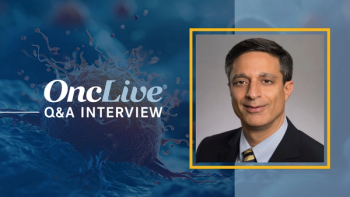
- November 2012
- Volume 6
- Issue 11
Addition of Motesanib to Chemotherapy Offers No Benefit for Patients With Non-Small Cell Lung Cancer
Motesanib combined with carboplatin/paclitaxel does not significantly improve OS versus carboplatin/ paclitaxel alone in patients with advanced nonsquamous non–small cell lung cancer, according to the results of the phase III MONET1 study.
Giorgio V. Scagliotti, MD
Motesanib combined with carboplatin/paclitaxel does not significantly improve overall survival (OS) versus carboplatin/ paclitaxel alone in patients with advanced nonsquamous non—small cell lung cancer (NSCLC), according to the results of the phase III MONET1 study.
The data also showed that the agent did not prolong OS in a subset of patients with adenocarcinoma histology. Giorgio V. Scagliotti, MD, professor of Medicine at the University of Turin, and colleagues elsewhere randomized 1090 patients to carboplatin (area under the curve, 6 mg/mL/min) and paclitaxel (200 mg/m2) intravenously for up to six 3-week cycles plus once-daily oral motesanib (125 mg) or placebo.
Study participants had stage IIIB/IV or recurrent nonsquamous NSCLC and had not undergone systemic therapy for advanced disease.
Motesanib is an oral, small-molecule targeted antagonist of VEGF receptors 1, 2, and 3; platelet-derived growth factor receptor; and Kit. The agent has shown antitumor activity in NSCLC patients when administered alone or combined with chemotherapy.
The study’s primary endpoint was OS. The median OS in the motesanib group was 13.0 months versus 11.0 months for the placebo group (hazard ratio [HR] = 0.90; 95% CI, 0.78-1.04; P = .14). In the subset of 890 patients with adenocarcinoma, the median OS was 13.5 months with motesanib and 11.0 months with placebo (HR = 0.88; 95% CI, 0.75-1.03; P = .11).
Phase III MONET1 Trial Results
Treatment
Median OS
Median PFS
ORR
Motesanib + Carboplatin/ Paclitaxel
13.0 mo
5.6 mo
40%
Carboplatin/ Paclitaxel
11.0 mo
5.4 mo
26%
P
value
.14
<.001
<.001
Mo indicates months; ORR, objective response rate; OS, overall survival; PFS, progression-free survival.
In all patients with nonsquamous histology, the median progression-free survival (PFS) time was 5.6 months for motesanib and 5.4 months for placebo, respectively (P <.001). The overall response rates (ORR) were 40% versus 26% (P <.001). PFS and ORR were secondary study endpoints.
A prespecified ethnicity/regional subanalysis revealed that Asian patients, who comprised 25% of the enrolled study population, were the only subset of patients who had improved OS from motesanib.
Serious adverse effects occurred in 49% of patients in the motesanib arm versus 34% in the chemotherapy-only arm. Motesanib-treated patients had an increased incidence of diarrhea, nausea, vomiting, abdominal pain, hypertension, proteinuria, stomatitis, gallbladder disorders, neutropenia, and thrombocytopenia.
The investigators found no association between levels of placental growth factor (PLGF) and response rate or survival. PLGF, which is a VEGF homolog that can promote angiogenesis by activating VEGF receptor 1, had been shown to increase in response to motesanib in a prior phase II study.
Scagliotti et al said that their findings bolster mounting evidence suggesting that VEGF pathway inhibitors in tandem with chemotherapy do not offer significant benefit to unselected patients with nonsquamous NSCLC. More studies with these agents are not likely to be fruitful without improved patient selection using biomarkers.
J Clin Oncol
Scagliotti GV, Vynnychenko I, Park K, et al. International, randomized, placebo-controlled, double-blind phase III study of motesanib plus carboplatin/paclitaxel in patients with advanced nonsquamous non—small-cell lung cancer: MONET1. . 2012;30(23):2829-2836.
Articles in this issue
about 13 years ago
Low-Dose Radioiodine Ablation Is Effective Treatment for Thyroid Cancerabout 13 years ago
Adjunctive Ketamine Does Not Relieve Cancer Painabout 13 years ago
Researchers Seek Optimal Dose of Cabozantinib in mCRPCabout 13 years ago
Pain in Oncology Outpatients With Solid Tumors Remains Undertreatedabout 13 years ago
Legal Considerations With Accountable Care Organizationsabout 13 years ago
EGFR Mutation Status Might Predict Sorafenib Benefit in NSCLCabout 13 years ago
Meningioma May Be Tied to Dental X-Raysabout 13 years ago
Peering Deeper Into the Black Box


































